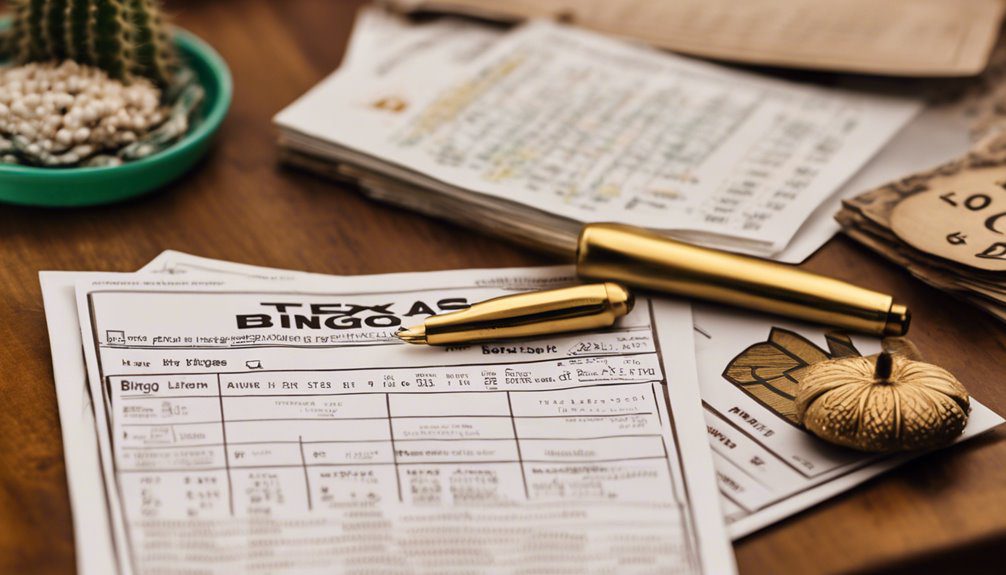When you're considering running a bingo operation in Texas, the License to Conduct Bingo Bond is more than just a regulatory requirement—it's a vital safeguard for your organization. This bond, which varies in amount based on your nonprofit's size, not only establishes credibility but also ensures compliance with state laws. Understanding the nuances of eligibility, application processes, and potential challenges can make all the difference. So, what are the specific steps you need to take to secure this bond and protect your interests? Let's explore the essential details.
Understanding Bingo Bonds

Understanding bingo bonds is essential for anyone looking to operate a bingo game legally in Texas. A bingo bond serves as a financial guarantee that protects players and ensures compliance with state regulations.
When you apply for a bingo license, you'll need to secure a bond, typically ranging from ,000 to $25,000, depending on your organization's size and the amount of bingo revenue you expect to generate. This bond acts as a safety net, ensuring that if your organization fails to uphold the rules or if any funds are mishandled, players can receive compensation.
It's not just a piece of paper; it signifies your commitment to fair play and accountability. To obtain a bingo bond, you'll need to work with a licensed surety company that can assess your organization's financial stability. They'll evaluate your creditworthiness and may require documentation to determine the appropriate bond amount.
In short, securing a bingo bond is a critical step in your journey to running a successful and legal bingo operation. This bond not only fulfills legal requirements but also builds trust with your players and the community.
Eligibility Requirements
What do you need to qualify for a Texas bingo license? First, you must be at least 18 years old. This age requirement ensures that you have the maturity and responsibility needed to manage bingo operations.
Next, you should be a member of a nonprofit organization that's been in existence for at least three years. This is crucial since Texas law allows only nonprofits to conduct bingo games.
You'll also need to demonstrate that your organization has a charitable purpose, like supporting education, health, or community service. Additionally, you mustn't have any felony convictions in the last 10 years. This requirement helps maintain the integrity of bingo operations in Texas.
Another important aspect is that your organization shouldn't have any pending legal actions related to bingo or gambling.
Finally, you'll need to provide a detailed plan on how you intend to run the bingo games, including how the proceeds will be used for charitable purposes. Meeting these eligibility requirements is essential before you can even think about applying for the bingo license.
Make sure you've got everything in order to increase your chances of approval.
Application Process

Navigating the application process for a Texas bingo license involves several key steps. First, you'll want to familiarize yourself with the Texas Bingo Act, which sets the foundation for your application. This ensures you understand the rules and regulations governing bingo operations in Texas.
Next, you'll need to complete the official application form provided by the Texas Lottery Commission. Take your time filling it out, as accuracy is crucial. Double-check your information to avoid delays.
Once your application form is complete, you'll need to submit it along with the required fees. Keep in mind that the fees vary based on the type of organization you represent, so be sure to check the latest fee schedule.
After submission, the commission will review your application. They may contact you for additional information or clarification, so be prepared to respond quickly. Additionally, ensure that you have the necessary surety bond renewal documentation ready for the application process.
Once approved, you'll receive your bingo license, which allows you to conduct bingo games legally.
Required Documentation
To successfully apply for a Texas bingo license, you'll need to gather several essential documents. First, prepare your completed application form, which you can obtain from the Texas Lottery Commission's website. Make sure it's filled out accurately.
Next, you'll need to provide a copy of your organization's charter or bylaws. This helps establish your organization's legitimacy and purpose. Additionally, include proof of your nonprofit status, such as a 501(c)(3) letter from the IRS. This documentation verifies that your organization is eligible to conduct bingo games.
You'll also need to submit a list of your organization's officers and directors, along with their personal information, including addresses and phone numbers. This allows the Texas Lottery Commission to perform necessary background checks.
Lastly, be prepared to provide financial records, such as your organization's most recent financial statement. This demonstrates your financial responsibility and transparency.
Once you have all these documents compiled, double-check them for accuracy and completeness before submission. Taking the time to ensure everything is in order will help streamline your application process and increase your chances of approval.
Bond Amounts and Costs

When applying for a Texas bingo license, you'll need to be aware of the bond amounts and associated costs that come with the process. The bond amount typically required for a bingo license in Texas is set at $10,000. This bond acts as a form of insurance, ensuring that you comply with state laws and regulations regarding bingo operations.
In addition to the bond amount, you'll encounter costs related to obtaining the bond itself. These costs can vary based on factors such as your credit history and the bonding company you choose. Generally, you can expect to pay a percentage of the total bond amount, often ranging from 1% to 15%.
So, for a $10,000 bond, you might pay between $100 and $1,500.
It's also crucial to factor in any additional fees, such as application fees or administrative costs, that your local jurisdiction may impose. Always budget for these expenses to ensure you're fully prepared for the licensing process.
Compliance and Regulations
Compliance with regulations is crucial for anyone operating a bingo game in Texas. You must familiarize yourself with the Texas Bingo Enabling Act and the rules set by the Texas Lottery Commission. These regulations dictate how you conduct games, manage finances, and distribute prizes. Ignoring these rules can lead to severe penalties, including losing your license.
First, ensure you obtain the necessary licenses. You'll need a bingo license for your organization and possibly additional permits for your specific location. Regularly renew these licenses to stay compliant.
It's also important to keep accurate financial records. You must report your income and expenses, especially since a portion of your earnings should go to charitable causes.
Additionally, familiarize yourself with the limits on prize amounts and how often you can hold bingo games. The rules around advertising your bingo games are also strictly regulated, so make sure your promotional materials comply with the guidelines.
Common Challenges

Running a bingo operation in Texas can present several challenges that require careful navigation.
First and foremost, you might face stringent compliance with local and state regulations. These rules can change frequently, so staying updated is crucial. Missing a requirement can lead to fines or even the loss of your license.
Another challenge is securing the necessary bonds and permits. The process can be time-consuming and may require detailed documentation, which can be overwhelming. For example, obtaining a Texas Health Spa Bond might be necessary depending on the services offered during bingo events.
You'll also need to ensure that your operation is financially viable, balancing expenses against expected revenues.
Additionally, competition can be fierce. With many organizations vying for attention, you must develop effective marketing strategies to attract players. This might involve offering promotions or special events, which can strain your resources.
Finally, managing volunteers and staff can be tricky. Coordinating schedules, training, and maintaining morale are all vital for a successful operation.
If you're not proactive in these areas, you risk burnout among your team and dissatisfaction among players.
Benefits of the Bond
Securing a Texas bingo license bond offers several key benefits that can significantly enhance your operation.
First and foremost, it ensures compliance with state regulations, allowing you to run your bingo games legally and without the risk of fines or penalties. This bond acts as a safety net, protecting both your organization and the public by ensuring that you adhere to the rules governing charitable gaming.
Additionally, having a bond can help build trust with potential players and community members. When they see that you're bonded, they'll feel more confident that your operation is legitimate and accountable. This trust can lead to increased participation and support for your events, ultimately boosting your fundraising efforts.
Another advantage is that it can enhance your organization's reputation. Being bonded demonstrates your commitment to ethical practices and responsible gaming, which can attract more volunteers and donations.
Lastly, should any disputes arise, the bond can provide a means of financial recourse, protecting your organization from potential losses. Moreover, obtaining a bond showcases your adherence to licensing laws, further solidifying your credibility in the community.
Resources for Further Information

To navigate the complexities of obtaining and maintaining a Texas bingo license bond, it's important to tap into reliable resources.
Start by visiting the Texas Secretary of State's website, where you'll find comprehensive guidelines on bingo licensing and bonding requirements. This official source will provide you with the most accurate and up-to-date information.
Next, consider reaching out to local bingo associations or nonprofit organizations involved in bingo operations. They often offer valuable insights and can connect you with experienced professionals who've successfully navigated the process.
Additionally, consulting with a qualified attorney familiar with Texas bingo laws can clarify any legal questions you might have.
Don't overlook the importance of surety bond companies. Many offer educational materials and customer support to help you understand the bonding process. They can guide you in selecting the right bond for your needs.
Conclusion
In conclusion, obtaining a Texas License to Conduct Bingo Bond is essential for your nonprofit organization. It not only ensures compliance with state regulations but also builds trust within your community. By securing this bond, you're demonstrating your commitment to ethical practices and protecting both your organization and your players. Don't overlook the benefits this bond brings; it's a vital step in fostering a responsible and successful bingo operation. Make sure you understand the requirements and start the application process today!

